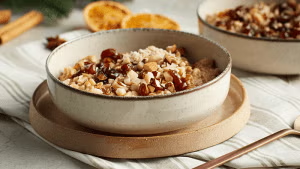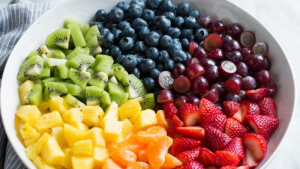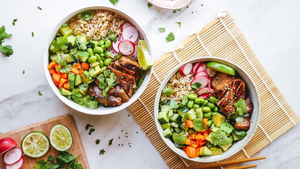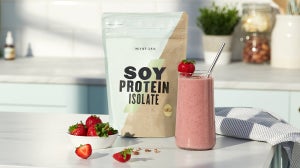
Bloating is a common condition, affecting around 20% of the population. It is also more common in females and those with gastrointestinal conditions such as IBS or IBD. Bloating is also common around the time of menstruation due to changes in hormone levels. Bloating is sometimes differentiated from abdominal distension however, they often occur together.
What Causes Bloating?
The causes of bloating are different for everyone however, there are some common triggers. These can include:
Constipation
Fizzy drinks
Food intolerances
Gut disorders (IBS, IBD)
Too much/too little fibre
Hormone health
Poor fluid intake
Inadequate sleep
While it is normal to have a certain amount of bloating after a big meal, for some people it can become a persistent problem. It can also be associated with symptoms such as tiredness, tummy pain or increased wind – none of which are particularly pleasant to experience!

What To Eat When Bloated
It can be tempting to avoid eating completely when feeling bloated. However, there are several foods and drinks that may help to alleviate bloating and associated symptoms. Below are 10 examples that might help to reduce discomfort.
1. Peppermint tea
The variety of compounds contained in peppermint means this herb can be beneficial when struggling with bloating. Peppermint facilitates the movement of excess gas through the digestive system; less gas usually means less bloating! Peppermint also has anti-nausea properties and may help to reduce the nausea that is sometimes associated with bloating.
2. Flaxseeds
These seeds contain a type of fibre known as ‘insoluble’ fibre. This means it can’t be digested – it is used to increase soften stool and increase bulk, which helps everything to move more easily through the digestive system. Bloating caused by constipation may benefit from a teaspoon of flaxseeds added to a smoothie or porridge bowl.
3. Oats
Oats are generally well tolerated, even by those with gut disorders such as IBS or IBD. Oats are high in soluble fibre, which absorbs water as it moves through the gut. This helps to soften stool and help to prevent constipation. Soluble fibre also helps to feed our gut microbiome – a healthy microbiome is essential for good digestion.

4. Yellow bananas
The darker the banana, the riper it is. During the ripening process, the natural sugars in bananas start to ferment, causing a change in sugars. This can make ripe bananas more difficult to digest than their yellow counterparts. Green bananas are generally unripe, and are known to cause GI discomfort, so avoid these if struggling with bloating.
5. Milk alternatives
Dairy products contain a type of natural sugar (lactose) that needs to be broken down into simpler sugars to be utilised efficiently. Difficulties breaking down these sugars can lead to fermentation in the gut, which can lead to bloating and wind. Around 1 in 10 adults have a degree of lactose intolerance, which can worsen these symptoms. Try swapping to plant-based milk alternatives if you are struggling with digesting dairy.
6. Berries
Berries can often be easier to digest than other types of fruits, as they contain more easily digestible types of fibres. Most berries also contain tiny seeds, which can contribute towards insoluble fibre intake, and help to stimulate the movement of stool through the gut. Strawberries, blackberries and raspberries are all good examples of bloat-friendly fruits.

7. Still water
The bubbles in carbonated drinks contain air which can become trapped in the gut and cause bloating. Not only that, but drinking out of a can also increases air intake, as it is more difficult to form a seal to prevent swallowing air. This trapped air can move through the digestive system and cause bloating. Try swapping to still water or squash to reduce bloating. Not a fan of plain water? Try adding clear protein powder for a flavour boost.
8. Ginger
This root contains not only anti-nausea properties but is useful in bloating and other functional gut symptoms. Ginger helps to speed up transit through the gut, which reduces time for fermentation and the creation of bad bacteria. Ginger may also be helpful in reducing any abdominal pains that occur as a result of bloating and distension.
9. Rice or quinoa
Gluten is a type of protein that can be found in wheat products such as bread and pasta. This can be difficult to digest for people with coeliac disease, gluten allergy/intolerance, or IBS. Swapping to naturally gluten-free grains such as rice, quinoa or millet may help to improve digestion
10. Potatoes
Potatoes are not only an incredibly versatile food, but are easily digestible for most people. If constipation is a struggle, leaving the skin on when cooking potatoes can help to boost fibre intake and speed up digestion. Alternatively, if you have sensitivities to fibre and are persistently bloated, you may find it more comfortable to remove the skins. White potatoes are the most allergen friendly, but if you no have issues with digesting sweet potatoes then try to include these, as they contain a variety of vitamins and minerals.
How To Avoid Bloating
As well as eating the right foods when bloating occurs, you can also take steps to avoid it happening in the first place. Here are some tips to help you avoid bloating.
1. Eat more slowly
Taking your time to eat, without distractions and allowing time to chew your food will help to reduce bloating. Eating quickly allows excess air to be swallowed, which the travels to the gut and causes bloating. Instead of watching TV or scrolling on your phone whilst eating, set aside the time to focus on your food. This will help to strengthen the mind-gut connection; this will increase awareness of sensations of fullness and satiety and prevent overeating (which can lead to bloating).

Manage stress appropriately
It’s well known that stress can have a variety of negative effects on the body; these can include changes in weight, acne, reduced immunity and a change in bowel habit (constipation or diarrhoea). Stress is also more likely to cause cravings for sugary or highly-processed foods, both of which can wreak havoc on our gut microbiome.
Make sure to get enough sleep
Inadequate amounts of sleep, like increased stress, can cause cravings for foods that aren’t necessarily the best for our gut health. Poor sleep is also more likely to make us feel hungrier, as it increases the hunger hormone ghrelin, whilst reducing the satiety hormone leptin. Lack of sleep also slows down the digestive process, which can lead to bloating as the waste products become stuck in transit.
Evaluate your fibre intake
The majority of people in the UK aren’t hitting the recommend goal of 30g of fibre per day. Insufficient dietary fibre can lead to constipation and bloating; without fibre, food will travel more slowly through the digestive tract, causing a build-up of bad bacteria (which leads to wind and bloating). However, those with sensitive guts may struggle with too much fibre; certain types of fibre can be difficult to digest for people with conditions such as IBS, IBD or leaky gut.
Stay hydrated
Adequate hydration is essential for helping food move through the gut; fluid is also important for correct stool formation. Not drinking enough water can lead to constipation, which in turn can lead to bloating. High sodium meals can cause bloating due to fluid retention however, drinking more fluids (especially water) will help your body to get rid of excess sodium and reduce bloating.

Talk to your nutritionist
This article is for educational purposes only and should not be used as a substitute for medical advice. Please contact your GP or other relevant healthcare professional if you have any concerns about your diet or gut health
Take home message
In summary, there are a variety of reasons why bloating might occur. The most common reasons include constipation (usually due to insufficient fibre intake), increased air intake, or food intolerances. When it comes to gut health there is no one-size-fits-all approach, so play around to find what works best for you.
FAQs
What causes too much gas in the stomach?
Excess air is the most common cause of gas in the stomach. This is usually due to the air bubbles found in fizzy drinks, or from eating quickly which causes additional air intake. In the gut, the fermentation process releases gas, which is the most common cause of bloating in the lower GI system.
How can I get rid of bloating?
Certain foods and drinks have been shown to improve bloating and abdominal distension. Lifestyle factors such as mindful eating, reducing stress levels, and meeting sleep needs may also be beneficial.
What foods should I eat to avoid gas and bloating?
Certain types of proteins (such as gluten) or sugars (such as lactose) may cause bloating or discomfort in people with gut disorders. Vegetables associated with increased bloating includes the Brassica family – cauliflower, broccoli and Brussel sprouts.
What should I not do when bloated?
Avoidance of eating and drinking whilst bloated may actually worsen symptoms; increasing your fluid intake will soften stool and stimulate gut motility. Assess your fibre intake to see if excess or insufficient fibre may be causing bloating, and adapt your diet accordingly.
- Bodagh M, Maleki I, Hekatdoost A. Ginger in gastrointestinal disorders: a systematic review of clinical trials. 2018; 7(1):96-108
- BUPA. Lactose intolerance [internet]. BUPA. (date unknown, due for review Jan 2025). Available from: https://www.bupa.co.uk/health-information/nutrition-diet/lactose-intolerance#:~:text=In%20the%20UK%2C%20around%20one,South%20America%2C%20Africa%20and%20Asia.
- Haber S, El-Ibiary S. Peppermint oil for treatment of irritable bowel syndrome. Am J Health Syst Pharm. 2016; 73(2): 22-31
- Hunt R, Quigley E, Zaigham A, Eliakim A, Emmanual A, Goh K-L, et al. Coping with common gastrointestinal symptoms in the community. J Clin Gastro. 2013; 48(7): 567-578 https://journals.lww.com/jcge/fulltext/2014/08000/Coping_With_Common_Gastrointestinal_Symptoms_in.4.aspx
- Jiang X, Locke G, Choung R, Zinsmeister A, Schleck C, Talley N. Prevalence and risk factors for abdominal bloating and visible distension. Gut. 2008; 57(6): 756-763
- NHS. How to get more fibre into your diet [internet]. NHS. July 2022. Available from: https://www.nhs.uk/live-well/eat-well/digestive-health/how-to-get-more-fibre-into-your-diet/









